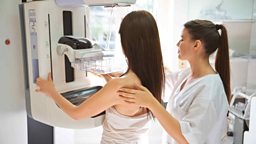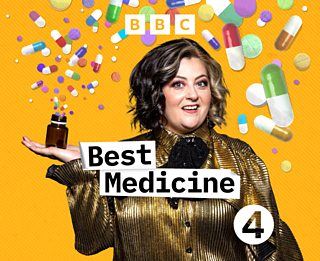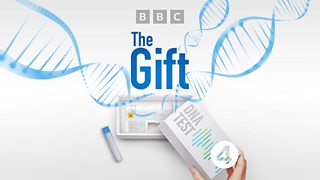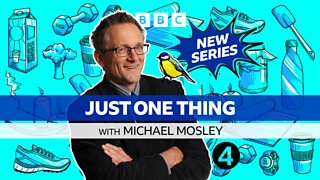Five things we learned about breasts from Best Medicine
In Radio 4’s Best Medicine, Kiri Pritchard-McLean assembles a panel of scientific experts and a fellow comedian and challenges them to make a case for what they think is "the best medicine". Each of them champions anything from an obscure invention to an unsung hero, or a futuristic cure.
In the Breast Medicine special, we hear about historical cancer treatments, boob jobs, a life-saving AI algorithm and injectable radiation. Plus, there’s even something for the men as well. Here are five new things we learned.

Breast cancer treatments have come a long way since the 1800s
Medical historian Dr Lindsey Fitzharris was successfully treated for breast cancer, and she says it was “an ordeal” but her research has left her thankful for all the medical advances that have occurred since the 1800s.
Lucy Thurston was diagnosed with breast cancer in the 1840s and she had to have a breast amputation without anaesthetic.Medical historian Lindsey Fitzharris
“Lucy Thurston was diagnosed with breast cancer in the 1840s and she had to have a breast amputation without anaesthetic. And it gets worse because the surgeon said I’m not going to tell you the day I’ll come back to your house to do it because I don’t want you to fixate on it [...] Which to me would make me way more anxious, not knowing when this guy is going to pop through the door!”
Thurston was lucky though – she survived. The period is dotted with similarly shocking cases. Isabella Lister, sister of the famous antiseptic surgery pioneer Joseph Lister, couldn’t find a surgeon to operate on her breast cancer because her case was so complicated. Her brother did the operation for her on their home dining-room table. Amazingly, she survived too.
“Ultimately what I went through was built on the bodies of those before me,” Fitzharris says.
AI radiologists are already helping to find breast cancers even earlier
As Sarah Kerruish, Chief Strategy Officer of Kheiron Medical Technologies puts it: “Cancer when it’s caught earlier is an entirely different disease. We’ve developed an AI algorithm called Mia that reads mammograms. It’s been trained on millions and million of images. It’s seen more images than any radiologist would see in probably ten or even a hundred lifetimes.”
AI programmes like Mia can help doctors sort thousands of scans much faster, by giving the scans a first look and pointing to potential cancers. “In a trial in Scotland it ran 80 thousands cases in a weekend. And it’s reporting in seconds,” she says. The programme is currently being deployed in 15 NHS hospitals.
Lindsey Fitzharris adds that cutting down the waiting time for mammogram results would have a huge mental health benefit: “If anything could speed that up, it gets us out of that mental prison.”
Synthetic breasts can be health care, and they’re high tech too
The comedian Jordan Gray got breast implants as part of her gender transition. She says it affected her health positively. “You could argue it's a preventative medicine because it saves a lot of feeling sad down the line, feeling dysmorphic down the line. Although it's certainly not a cure-all.”

And implant technology has come a long way from silicone discs. Gray’s implants are “B-Lite”, the same material used to insulate the International Space Station. “It’s like silicone but it’s all hollow like the bone of a bird so it can fly around,” she explains.
The process is high tech from the very start. “There was a 3D scanner machine where they scanned my body, put a VR headset on me, and allowed me to look down so I could see what my boobs would look like on my body.”
Men shouldn’t forget, they can get breast cancer too
An ex-police officer named Dave in the audience shares his story of being one of the 350 men per year diagnosed with breast cancer in the UK. Fortunately, as soon as he felt a lump, he had a mammogram. “Ten days later I was diagnosed with breast cancer.”
Thankfully Dave received successful treatment. But he has a message for men: “If your body changes, for goodness’ sake go and see the GP. As a gender we are a nightmare at getting to the doctor.”
Breast cancer treatments may get even better in the next decade
Dr Samantha Terry, a Radiobiology researcher at King’s College London, explains that the problem with a lot of current cancer treatments like radiotherapy is that they can hurt your body's healthy cells because they don’t hit cancer cells precisely enough. Terry’s research group is using something called Auger electrons, attached to a cancer drug. It gets injected into your bloodstream, travels through your blood and keeps going round and round until it finds the cancer cells, where it delivers a precise dose of radiation.
As it is so precise and unlikely to damage nearby cells, doctors could potentially give it to healthy patients, as a preventative measure. “We could get to the point where we end up giving this treatment to anybody who is at a high risk of a particular type of cancer. So that we’re preventing its occurrence,” says Terry. She thinks the treatment could be ready to go within the next decade.
Listen to Best Medicine on ������̳ Sounds
This article was amended on 30th October 2023 to correct a medical term.
More from ������̳ Radio 4
-
![]()
The Gift – Health
What happens when a DNA test result shows you may be predisposed to serious illness?
-
![]()
A Thorough Examination with Drs Chris and Xand
Drs Chris and Xand van Tulleken explore if people can change and how they do it.
-
![]()
Just One Thing with Michael Mosley
Michael Mosley reveals surprisingly simple tips to improve your health and wellbeing.
-
![]()
Sliced Bread
Greg Foot investigates the so-called wonder products making bold claims.





